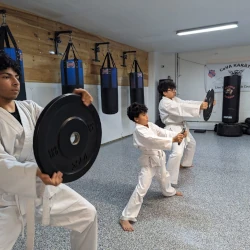Functional Fitness through Karate


From Strength to Flexibility: Harnessing Functional Fitness in Karate for a Healthier You
Karate, a traditional martial art form originating from Okinawa, offers more than just self-defense skills and discipline. It also provides numerous benefits for improving fitness, flexibility, endurance, balance, and overall health. In this blog post, we will delve into the functional fitness aspects of karate, highlighting how it can contribute to achieving a stronger body and enhanced well-being.
Fitness
Building Strength and Conditioning Karate training involves a variety of movements, strikes, blocks, and kicks, which require strength and power. Practitioners engage in rigorous physical exercises that target the major muscle groups, resulting in improved overall strength and muscular endurance. The constant repetition of techniques during training sessions helps build cardiovascular fitness, enhancing stamina and endurance levels.
Flexibility
Unlocking Range of Motion Flexibility is a crucial component of functional fitness, enabling individuals to move more efficiently and with reduced risk of injury. Karate places significant emphasis on stretching and dynamic movements that increase flexibility and joint mobility. Regular practice helps improve range of motion, allowing for fluid and controlled execution of techniques. Increased flexibility in the muscles and joints also contributes to better posture and overall body alignment.
Endurance
Building Stamina and Mental Resilience Karate training sessions involve continuous movement, quick bursts of energy, and sustained effort. These elements challenge and develop both physical and mental endurance. As practitioners progress in their training, they gradually build stamina, enabling them to perform longer and more intense workouts. The mental resilience cultivated through karate allows individuals to push past their perceived limits, promoting a resilient mindset in all areas of life.
Balance
Enhancing Stability and Coordination Balance is a fundamental aspect of functional fitness, as it directly impacts daily activities and helps prevent falls and injuries. Karate training includes specific exercises and techniques that focus on balance and coordination. Through constant practice of stances, kicks, and footwork, practitioners develop stability, proprioception, and improved control over their body movements. This heightened sense of balance transfers to everyday life, enhancing stability in various physical activities and reducing the risk of accidents.
Holistic Health
The Holistic Benefits of Karate In addition to the physical aspects, karate offers a range of holistic benefits for overall health and well-being. Regular practice promotes cardiovascular health, strengthens the immune system, and helps manage weight. The mental focus and discipline cultivated in karate training contribute to stress reduction, improved concentration, and increased self-confidence. The practice of karate also fosters a sense of community and camaraderie, providing social support and a positive environment for personal growth.
Functional fitness is an integral part of karate, offering numerous benefits for those seeking a stronger body and improved overall health. Through karate training, individuals can enhance their fitness levels, flexibility, endurance, balance, and mental resilience. The holistic nature of karate contributes to physical well-being, while also nurturing mental and emotional aspects of health. Whether you are a beginner or an experienced practitioner, embracing the functional fitness aspects of karate can lead to a healthier and more fulfilling lifestyle. So, step onto the mat, challenge yourself, and experience the transformative power of functional fitness in karate.